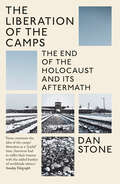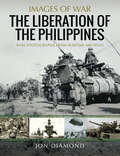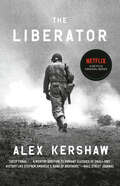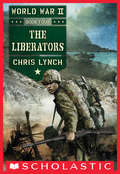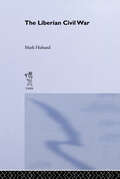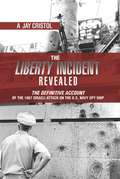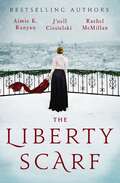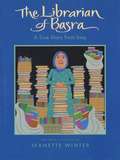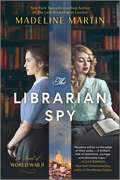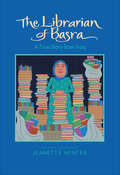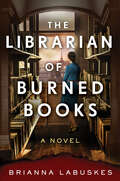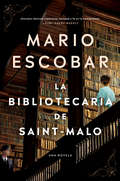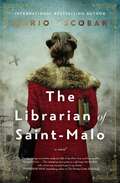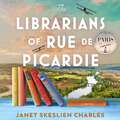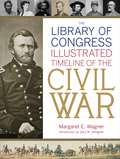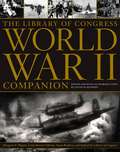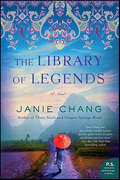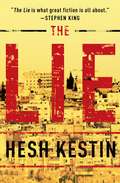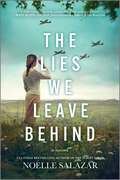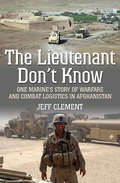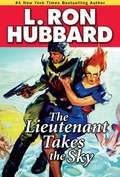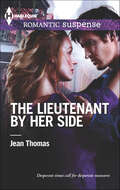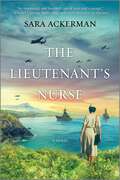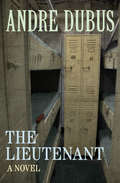- Table View
- List View
The Liberation of the Camps: The End of the Holocaust and Its Aftermath
by Dan StoneSeventy years have passed since the tortured inmates of Hitler's concentration and extermination camps were liberated. When the horror of the atrocities came fully to light, it was easy for others to imagine the joyful relief of freed prisoners. Yet for those who had survived the unimaginable, the experience of liberation was a slow, grueling journey back to life. In this unprecedented inquiry into the days, months, and years following the arrival of Allied forces at the Nazi camps, a foremost historian of the Holocaust draws on archival sources and especially on eyewitness testimonies to reveal the complex challenges liberated victims faced and the daunting tasks their liberators undertook to help them reclaim their shattered lives. Historian Dan Stone focuses on the survivors--their feelings of guilt, exhaustion, fear, shame for having survived, and devastating grief for lost family members; their immense medical problems; and their later demands to be released from Displaced Persons camps and resettled in countries of their own choosing. Stone also tracks the efforts of British, American, Canadian, and Russian liberators as they contended with survivors' immediate needs, then grappled with longer-term issues that shaped the postwar world and ushered in the first chill of the Cold War years ahead.
The Liberation of the Philippines (Images of War)
by Jon Diamond Dr.General Douglas A MacArthur, Commander of the Southwest Pacific Area, saw the liberation of the Philippines Archipelago as the launching board for the invasion of the Japanese Home Islands. By late 1944, with the capture of New Guinea and surrounding islands, the US Sixth and Eighth Armies were poised for the challenge. American forces landed on Leyte on 20 October 1944 with the Leyte Gulf naval battle quickly following. By 25 December the island was cleared opening the way for Lieutenant General Walter Krueger’s Sixth Army to invade Luzon on 9 January 1945. Bitter Japanese resistance required Eichelberger’s Eighth Army as reinforcements. Manila finally fell on 4 March. In the meantime Bataan was captured on 16 February and Corregidor on 2 March after a US airborne assault. Fighting continued and MacArthur finally declared the liberation of the Archipelago on 5 July, just a month before the Atom bombs fell on Hiroshima and Nagasaki. This superbly illustrated work in the Pacific War Images of War series leaves the reader in no doubt as to the intensity of the land, sea and air operations required by the Allies to defeat the Japanese.
The Liberator: One World War II Soldier's 500-Day Odyssey from the Beaches of Sicily to the Gates of Dachau
by Alex KershawThe untold story of the bloodiest and most dramatic march to victory of the Second World War—now a Netflix original series starring Jose Miguel Vasquez, Bryan Hibbard, and Bradley James &“Exceptional . . . worthy addition to vibrant classics of small-unit history like Stephen Ambrose&’s Band of Brothers.&”—Wall Street Journal Written with Alex Kershaw's trademark narrative drive and vivid immediacy, The Liberator traces the remarkable battlefield journey of maverick U.S. Army officer Felix Sparks through the Allied liberation of Europe—from the first landing in Italy to the final death throes of the Third Reich.Over five hundred bloody days, Sparks and his infantry unit battled from the beaches of Sicily through the mountains of Italy and France, ultimately enduring bitter and desperate winter combat against the die-hard SS on the Fatherland's borders. Having miraculously survived the long, bloody march across Europe, Sparks was selected to lead a final charge to Bavaria, where he and his men experienced some of the most intense street fighting suffered by Americans in World War II.And when he finally arrived at the gates of Dachau, Sparks confronted scenes that robbed the mind of reason—and put his humanity to the ultimate test.
The Liberators (World War II #4)
by Chris Lynch"All the sizzle, chaos, noise and scariness of war is clay in the hands of ace storyteller Lynch." -- Kirkus ReviewsChris Lynch concludes his gritty, thoughtful, and critically acclaimed WWII fiction series -- providing entirely new insight into "The Good War."The US Marines Corps is home to some of the roughest, toughest combatants in World War II. Their courage and daring are legendary. And the best of the best -- the boldest among them -- are joining the Corps' elite new paratrooper combat unit. As Paramarines, they'll be expected to do everything a typical Marine does... and do it while skydiving.Nick Nardini knows that he's destined to become a Paramarine. He also knows that he has to convince his best friend, Zachary Klecko, to sign up too. Nardini and Klecko used to be inseparable, ever since they met in kindergarten, but recently they've been drifting apart. Fighting in the same battalion -- and jumping out of the same planes -- seems to Nardini like a surefire way to restore their bond and come out of the war stronger than ever.The Axis powers, however, may have other ideas...
The Liberian Civil War
by Mark HubandThe civil war in 1989 promised freedom from ten years of vicious dictatorship; instead the seeds of Liberia's devastation were sown. Mark Huband's account of the conflict is a portrayal of the war as it unfolded, drawing on the author's experience of living amongst the fighters.
The Liberty Incident Revealed
by A. Jay CristolCutting through all of the controversy and conspiracy theories about Israel's deadly attack on the USS Liberty in June 1967 at the height of the Six Day War, Cristol revises his well-regarded book about the event with a complete, in-depth analysis of all of the sources, including recently released tapes from National Security Agency. When the first edition of The Liberty Incident was published in 2002 there remained many unanswered questions about Israeli Air Force audio tapes intercepted by the NSA. Some alleged they would prove that the Israeli attack was premeditated. Cristol's successful Freedom of Information Act lawsuit against the National Security Agency, while resulting in the release of those tapes, has been greeted by anti-Israel sources insisting that the NSA tapes are fraudulent and are part of a larger conspiracy to deceive the American public!After a quarter of a century of intensive research in Israel and the U.S., researching all relevant archives from NSA, CIA and the State Department, reviewing both formerly classified and open source documents, and interviewing all then-living individuals directly involved in the incident, the factual and documentary record is clear. Cristol maintains that despite the fact that all of the official records and transcripts are now available for review, the truth has proven to be of no interest to those individuals and organizations who are motivated by hidden agendas, wish to keep conspiracy theories alive, or are trying to feed sensational stories to the media. Documenting his findings in six new chapters, Cristol establishes in THE LIBERTY INCIDENT REVEALED that the Israeli attack was a tragic mistake and presents a convincing argument that will be regarded as the final story about this incident.
The Liberty Scarf: A Story of Three Women, One War, and a Scarf That Binds Them Together
by Aimie K. Runyan Rachel McMillan J'nell CiesielskiFrom acclaimed authors Aimie K. Runyan, J'nell Ciesielski, and Rachel McMillan comes an evocative, three-part novel about a thread of connection during World War I--a single scarf that links three extraordinary women, each battling societal expectations, enduring the devastations of war, and striving for personal growth amidst the chaos. The Liberty Scarf is a testament to the resilience of women and the enduring power of hope and unity in the harshest of times.In the midst of a seemingly endless war, a scarf connects three women in the cold winter of 1917 . . .London: As an ambitious scarf maker, Iris Braxton spends her days surrounded by color and luxury not often seen during the dark days of war that were promised to be over by Christmas. That promise has come and gone for three years with still no end in sight, and her days continue in a monotony of rations and threads while she spins a dream of becoming Liberty's first female pattern designer. She hasn't the time or interest in rakish soldiers, but the temporarily-on-leave Captain Rex Conrad is persistent--and before long his charm wins her over. But war is cruel, and, all too soon, Conrad leaves once more for the Front, but not before vowing to meet again in Strasbourg, France, the most magical of Christmas cities. Iris begins stitching small messages into each of the scarves she makes in hopes that one will find a way into Rex's hands to let him know she's thinking of him. And when she receives word that he's wounded in Strasbourg, she rushes to his side. Along the way, she passes a woman wearing one of her scarves . . .Maine: Geneviève Tremblay, a French-Canadian immigrant, is a telephone operator living in Lewiston, Maine. Her beau is a member of a prominent family who has helped to Americanize her in a community often unfriendly to Canadians. As part of this effort, she enlists in the US Army Signal Corps to serve as a bi-lingual operator. Along the way, she meets a French officer who makes her question whether losing her identity is too heavy a price for acceptance.Belgium: Clara Janssens, a Flemish Nurse, and Roman Allaire, an Alsatian violinist, connect in a Brussels palace-turned-hospital far beyond their routine provincial and countryside lives--and the expectations in those towns. Their love of music creates a spark between them, but the destruction of battle and the transient nature of their relationship threatens the bond they have built. Still, the appearance of a kind stranger and the unexpected gift of a treasured scarf bind them long beyond their stolen moments and offer them a future brighter than they could have even hoped.The Liberty Scarf is more than a piece of fabric--it's a symbol of hope, resilience, and unity in the face of war, binding these three women together in an indelible bond. Experience their stories of love, sacrifice, and survival in this captivating novel from Aimie K. Runyan, J'nell Ciesielski, and Rachel McMillan.
The Librarian Of Basra: A True Story From Iraq
by Jeanette Winter"In the Koran, the first thing God said to Muhammad was 'Read. '"* --Alia Muhammad Baker Alia Muhammad Baker is a librarian in Basra, Iraq. For fourteen years, her library has been a meeting place for those who love books. Until now. Now war has come, and Alia fears that the library--along with the thirty thousand books within it--will be destroyed forever. In a war-stricken country where civilians--especially women--have little power, this true story about a librarian's struggle to save her community's priceless collection of books reminds us all how, throughout the world, the love of literature and the respect for knowledge know no boundaries. Includes an author's note. *From the New York Times, July 27, 2003
The Librarian Spy: A Novel of World War II
by Madeline MartinA NATIONAL BESTSELLER—for fans of All the Light We Cannot See and The Tattooist of Auschwitz!&“Readers will be on the edge of their seats…. A brilliant tale of resistance, courage and ultimately hope.&” –Kelly Rimmer, New York Times bestselling author of The Warsaw OrphanFrom the New York Times bestselling author of The Last Bookshop in London comes a moving new novel inspired by the true history of America&’s library spies of World War II.Ava thought her job as a librarian at the Library of Congress would mean a quiet, routine existence. But an unexpected offer from the US military has brought her to Lisbon with a new mission: posing as a librarian while working undercover as a spy gathering intelligence.Meanwhile, in occupied France, Elaine has begun an apprenticeship at a printing press run by members of the Resistance. It&’s a job usually reserved for men, but in the war, those rules have been forgotten. Yet she knows that the Nazis are searching for the press and its printer in order to silence them.As the battle in Europe rages, Ava and Elaine find themselves connecting through coded messages and discovering hope in the face of war.&“Uplifting, inspiring and suspenseful, this is one to savor!&” –Natasha Lester, New York Times bestselling author of The Riviera House &“Madeline Martin is a fantastic author. The Librarian Spy is a stunning tour de force of historical fiction.&” –Karen Robards, author of The Black Swan of ParisDon't miss Madeline Martin's next heartwarming historical novel, The Booklover's Library!Also by Madeline Martin: The Last Bookshop in London The Keeper of Hidden Books
The Librarian of Basra: A True Story from Iraq
by Jeanette Winter Jeanette Winter*ALA Notable Children&’s book 2006 *Celebrated author-illustrator Jeanette Winter weaves a hopeful tale of one woman&’s courageous book rescue. In the Spring of 2003, Alia Muhammad Baker was the city of Basra&’s real-life librarian. She was the keeper of cherished books and her library was a haven for community gatherings. But with war imminent in Basra, Iraq, what could this lone woman do to save her precious books? With lyrical, spare text and beautiful acrylic illustrations, Jeanette Winter shows how well she understands her young audience. This true story of one librarian&’s remarkable bravery reminds us all how, throughout the world, the love of literature and the respect for knowledge knows no boundaries.
The Librarian of Burned Books: A Novel
by Brianna LabuskesFor fans of The Rose Code and The Paris Library, The Librarian of Burned Books is a captivating WWII-era novel about the intertwined fates of three women who believe in the power of books to triumph over the very darkest moments of war. Berlin 1933. Following the success of her debut novel, American writer Althea James receives an invitation from Joseph Goebbels himself to participate in a culture exchange program in Germany. For a girl from a small town in Maine, 1933 Berlin seems to be sparklingly cosmopolitan, blossoming in the midst of a great change with the charismatic new chancellor at the helm. Then Althea meets a beautiful woman who promises to show her the real Berlin, and soon she’s drawn into a group of resisters who make her question everything she knows about her hosts—and herself.Paris 1936. She may have escaped Berlin for Paris, but Hannah Brecht discovers the City of Light is no refuge from the anti-Semitism and Nazi sympathizers she thought she left behind. Heartbroken and tormented by the role she played in the betrayal that destroyed her family, Hannah throws herself into her work at the German Library of Burned Books. Through the quiet power of books, she believes she can help counter the tide of fascism she sees rising across Europe and atone for her mistakes. But when a dear friend decides actions will speak louder than words, Hannah must decide what stories she is willing to live—or die—for.New York 1944. Since her husband Edward was killed fighting the Nazis, Vivian Childs has been waging her own war: preventing a powerful senator’s attempts to censor the Armed Service Editions, portable paperbacks that are shipped by the millions to soldiers overseas. Viv knows just how much they mean to the men through the letters she receives—including the last one she got from Edward. She also knows the only way to win this battle is to counter the senator’s propaganda with a story of her own—at the heart of which lies the reclusive and mysterious woman tending the American Library of Nazi-Banned Books in Brooklyn.As Viv unknowingly brings her censorship fight crashing into the secrets of the recent past, the fates of these three women will converge, changing all of them forever.Inspired by the true story of the Council of Books in Wartime—the WWII organization founded by booksellers, publishers, librarians, and authors to use books as “weapons in the war of ideas”—The Librarian of Burned Books is an unforgettable historical novel, a haunting love story, and a testament to the beauty, power, and goodness of the written word.
The Librarian of Saint-Malo \ La bibliotecaria de Saint-Malo (Spanish edition)
by Mario EscobarUn corazón puro puede iluminar aun la noche más oscura.Y en el más terrible de los momentos de la historia.Jocelyn es la guardiana de la Biblioteca de Saint-Malo, una mujer huérfana que se aferra a la literatura y a su marido Antoine. Pero ambos corren peligro: la llegada de las tropas alemanas a la ciudad, en especial aquella del comandante Adolf Bauman, empeñado en robar algunos de los incunables que tan celosamente guarda la bibliotecaria, quiere acabar con su felicidad.El capitán Hermann von Choltitz, amante de los libros, es enviado por las autoridades alemanas para expurgar las bibliotecas de la región, pero se resiste a destruirlos. Jocelyn y Hermann comenzarán una amistad imposible: los libros les unen, pero la violencia y la guerra los separa.Destinados a ser enemigos y obligados a vivir en un mundo en el que se ha desatado la locura, los inolvidables protagonistas de esta hermosa y emocionante historia se convertirán en héroes cuyo amor vencerá incluso a la guerra.Los lectores que disfrutaron con La luz que nos puedes ver, de Anthony Doerr o El Ruiseñor, de Kristin Hannah, no podrán perderse esta historia de amor, pasión y suspense. «[Escobar] escribe historias que llegan al corazón».—Jesús Alejo Santiago, Revista MilenioMARIO ESCOBAR es novelista, historiador y colaborador habitual de National Geographic Historia, ha dedicado su vida a la investigación de los grandes conflictos humanos. Sus libros han sido traducidos a más de doce idiomas, convirtiéndose en bestsellers en países como los Estados Unidos, Brasil, China, Rusia, Italia, México, Argentina y Japón. Es el autor más vendido en formato digital en español en Amazon y fue otorgado el Premio de Novela Empik (Polonia, 2020).
The Librarian of Saint-Malo: A Novel
by Mario EscobarThrough letters with a famous author, one French librarian tells her love story and describes the brutal Nazi occupation of her small coastal village.Saint-Malo, France: August 1938. Jocelyn and Antoine are childhood sweethearts, but just after they marry and are hoping for a child, Antoine is called up to fight against Germany. As the war rages, Jocelyn focuses on comforting and encouraging the local population by recommending books from her beloved library in Saint-Malo. She herself finds hope in her letters to a famous author.After the French capitulation, the Nazis occupy the town and turn it into a fortress to control the north of French Brittany. Residents try passive resistance, but the German commander ruthlessly purges part of the city's libraries to destroy any potentially subversive writings. At great risk to herself, Jocelyn manages to hide some of the books while waiting to receive news from Antoine, who has been taken to a German prison camp.What unfolds in her letters is Jocelyn&’s description of her mission: to protect the people of Saint-Malo and the books they hold so dear. With prose both sweeping and romantic, Mario Escobar brings to life the occupied city and re-creates the history of those who sacrificed all to care for the people they loved.
The Librarians of Rue de Picardie: From the bestselling author, a powerful, moving wartime page-turner based on real events
by Janet Skeslien CharlesThe New York Times bestselling author of the The Paris Library returns with a powerful, moving new novel based on the extraordinary true story of Jessie Carson, the American librarian determined to bring books to the children of war-torn France.'This is hands down my book of 2024. A rich, glorious life-affirming ode to the power of books and female solidarity. Simply unforgettable!' KATE THOMPSON'A wonderful story about the power books have not only to inspire, but also to rescue and restore. The characters are so richly drawn... I absolutely loved it' RUTH HOGAN------------------------Under what was left of the roof of the ruined cottage, a girl with pigtails perched on a pile of rubble, hunched over a book...1918: As the Great War rages, Jessie Carson takes a leave of absence from the New York Public Library to work for the American Committee for Devastated France, a group of women determined to rebuild devastated French communities just miles from the front. Upon arrival, Jessie strives to establish something that the French have never seen - children's libraries. She turns ambulances into bookmobiles and trains the first French female librarians. Then she disappears.1987: When NYPL librarian and aspiring writer Wendy Peterson stumbles across a passing reference to Jessie Carson in the archives, she becomes consumed with learning her fate. In her obsession, she discovers that she and the elusive librarian have more in common than their work at New York's famed library, but she has no idea their paths will converge in surprising ways across time.*Published under the title Miss Morgan's Book Brigade in the US*'An astonishing novel with the beating heart of courageous women who change the world through books. For every reader who was once told to get their head out of the clouds because they read too many books, this one is for you... A moving novel of sacrifice, heroism, and inspired storytelling immersed in the power of books to change our lives' PATTI CALLAHAN HENRY'Bursting with remarkable characters and filled with heart-in-mouth moments... an enthralling, emotional story rich in historical detail. Janet Skeslien Charles has done real justice to the legacy of these courageous women; this wonderful book is a gift to the reader' LIESE O'HALLORAN SCHWARZ'Bibliophiles are in for a treat' PUBLISHERS WEEKLY'I found myself captivated by this eye-opening book and reminder of the good that comes from dedicated hard work. I am grateful to Janet Skeslien Charles for educating me about the remarkable women of CARD' ⭐ ⭐ ⭐ ⭐ ⭐ Goodreads reviewer 'I love books about libraries and books. The fact that this book is actually based off of real people is amazing. This book celebrates the contributions that these women made when they are usually swept under the rug. I loved Jessie so much, and I will be thinking of these brave women for a long time to come' ⭐ ⭐ ⭐ ⭐ ⭐ Goodreads reviewer
The Librarians of Rue de Picardie: From the bestselling author, a powerful, moving wartime page-turner based on real events
by Janet Skeslien CharlesThe New York Times bestselling author of the The Paris Library returns with a powerful, moving new novel based on the extraordinary true story of Jessie Carson, the American librarian determined to bring books to the children of war-torn France.'This is hands down my book of 2024. A rich, glorious life-affirming ode to the power of books and female solidarity. Simply unforgettable!' KATE THOMPSON'A wonderful story about the power books have not only to inspire, but also to rescue and restore. The characters are so richly drawn... I absolutely loved it' RUTH HOGAN------------------------Under what was left of the roof of the ruined cottage, a girl with pigtails perched on a pile of rubble, hunched over a book...1918: As the Great War rages, Jessie Carson takes a leave of absence from the New York Public Library to work for the American Committee for Devastated France, a group of women determined to rebuild devastated French communities just miles from the front. Upon arrival, Jessie strives to establish something that the French have never seen - children's libraries. She turns ambulances into bookmobiles and trains the first French female librarians. Then she disappears.1987: When NYPL librarian and aspiring writer Wendy Peterson stumbles across a passing reference to Jessie Carson in the archives, she becomes consumed with learning her fate. In her obsession, she discovers that she and the elusive librarian have more in common than their work at New York's famed library, but she has no idea their paths will converge in surprising ways across time.*Published under the title Miss Morgan's Book Brigade in the US*'An astonishing novel with the beating heart of courageous women who change the world through books. For every reader who was once told to get their head out of the clouds because they read too many books, this one is for you... A moving novel of sacrifice, heroism, and inspired storytelling immersed in the power of books to change our lives' PATTI CALLAHAN HENRY'Bursting with remarkable characters and filled with heart-in-mouth moments... an enthralling, emotional story rich in historical detail. Janet Skeslien Charles has done real justice to the legacy of these courageous women; this wonderful book is a gift to the reader' LIESE O'HALLORAN SCHWARZ'Bibliophiles are in for a treat' PUBLISHERS WEEKLY'I found myself captivated by this eye-opening book and reminder of the good that comes from dedicated hard work. I am grateful to Janet Skeslien Charles for educating me about the remarkable women of CARD' ⭐ ⭐ ⭐ ⭐ ⭐ Goodreads reviewer 'I love books about libraries and books. The fact that this book is actually based off of real people is amazing. This book celebrates the contributions that these women made when they are usually swept under the rug. I loved Jessie so much, and I will be thinking of these brave women for a long time to come' ⭐ ⭐ ⭐ ⭐ ⭐ Goodreads reviewer
The Library of Congress Illustrated Timeline of the Civil War
by Margaret E. Wagner Gary W. GallagherWith striking visuals from the Library of Congress' unparalleled archive, THE LIBRARY OF CONGRESS ILLUSTRATED TIMELINE OF THE CIVIL WAR is an authoritative and engaging narrative of the domestic conflict that determined the course of American history. A detailed chronological timeline of the war captures the harrowing intensity of 19th-century warfare in first-hand accounts from soldiers, nurses, and front-line journalists. Readers will be enthralled by speech drafts in Lincoln's own hand, quotes from the likes of Frederick Douglass and Robert E. Lee, and portraits of key soldiers and politicians who are not covered in standard textbooks. The Illustrated Timeline's exciting new source material and lucid organization will give Civil War enthusiasts a fresh look at this defining period in our nation's history.
The Library of Congress World War II Companion
by David M. KennedyThe noted historian John Keegan called World War II "the largest single event in human history." More than sixty years after it ended, that war continues to shape our world. Going far beyond accounts of the major battles, The Library of Congress World War II Companion examines, in a unique and engaging manner, this devastating conflict, its causes, conduct, and aftermath. It considers the politics that shaped the involvement of the major combatants; military leadership and the characteristics of major Allied and Axis armed services; the weaponry that resulted in the war's unprecedented destruction, as well as debates over the use of these weapons; the roles of resistance groups and underground fighters; war crimes; daily life during wartime; the uses of propaganda; and much more. Drawn from the unparalleled collections of the institution that has been called "America's Memory," The Library of Congress World War II Companion includes excerpts from contemporary letters, journals, pamphlets, and other documents, as well as first-person accounts recorded by the Library of Congress Veterans History Project. The text is complemented by more than 150 illustrations. Organized into topical chapters (such as "The Media War," "War Crimes and the Holocaust," and two chapters on "Military Operations" that cover the important battles), the book also include readers to navigate through the rich store of information in these pages. Filled with facts and figures, information about unusual aspects of the war, and moving personal accounts, this remarkable volume will be indispensable to anyone who wishes to understand the World War II era and its continuing reverberations.
The Library of Legends: A Novel
by Janie Chang“A gorgeous, poetic journey threaded with . . . magic about a group from a Chinese university who take to the road to escape the Japanese invasion of 1937” —Kate Quinn, New York Times–bestselling author of The Alice Network and The HuntressChina, 1937: When Japanese fall on the city of Nanking, Hu Lian and her classmates at Minghua University are ordered to flee. Lian and a convoy of more than a hundred students, faculty, and staff must walk a thousand miles to the safety of China’s western provinces, a journey marred by hunger, cold, and the threat of aerial attack. And it is not just the student refugees who are at risk: Lian and her classmates have been entrusted with a priceless treasure, a 500-year-old collection of myths and folklore known as the Library of Legends.Within the convoy, Lian finds friendship and romance with handsome Liu Shaoming. But after one classmate is murdered and another arrested, Lian must escape before a family secret puts her in danger. Accompanied by Shao and his maidservant Sparrow, Lian makes her way to Shanghai, hoping to reunite with her mother.On the journey, Lian learns of the connection between her two companions and a tale from the Library of Legends, The Willow Star and the Prince. Learning Shao and Sparrow’s true identities compels Lian to confront her feelings for Shao. But there are broader consequences too, for as the ancient books travel across China, they awaken immortals and guardian spirits to embark on an exodus of their own, one that changes the country’s fate forever.“Janie Chang has beautifully melded history and the spirit world to create an adventurous love story.” —Lisa See, New York Times bestselling author of Shanghai Girls
The Lie: A Novel
by Hesh KestinA provocative thriller about a dynamic Israeli lawyer—famous for defending accused Palestinians—whose views are tested when her own son is taken captive by Hezbollah: “The Lie is what great fiction is all about” (Stephen King).Dahlia Barr is a devoted mother, soon-to-be divorced wife, lover of an American television correspondent. She is also a brash and successful Israeli attorney who is passionate about defending Palestinians accused of terrorism. One day, to her astonishment, the Israeli national police approach Dahlia with a tantalizing proposition: Join us, and become the government’s arbiter on when to use the harshest of interrogation methods—what some would call torture. Dahlia is intrigued. She has no intention of permitting torture, but can she change the system from within? She takes the job. As Dahlia settles into her new role, her son Ari, a twenty-year-old lieutenant in the Israel Defense Forces, is kidnapped by Hezbollah and whisked over the border to Lebanon. The one man who may hold the key to Ari’s rescue is locked in a cell in police headquarters. He is an Arab who has a long and complicated history with Dahlia. And he’s not talking. Yet. A nail-biting thriller that “will stay with you” (The New York Times Book Review), The Lie is an unforgettable story of human beings on both sides of the terror equation whose lives turn out to share more in common than they ever could have imagined. “An utterly riveting thriller that is likely to rank as one of the year’s best…The Lie has everything: memorable characters, a compelling plot, white-knuckle military action, and an economy and clarity of prose that is direct, powerful, and at times beautiful” (Booklist, starred review).
The Lies We Leave Behind: A Novel
by Noelle Salazar&“Noelle Salazar has an unerring instinct for writing tough women with big hearts . . . The Lies We Leave Behind is a globe-spanning wartime journey filled with pathos and heart!&” —Kate Quinn, New York Times bestselling author of The Rose CodeFor fans of Kate Quinn and Beatriz Williams, this sweeping story follows a fearless nurse who must leave love behind when duty calls her back to the front.Somewhere in the Pacific, 1943. Kate Campbell is a nurse who bravely flies back and forth from the front to rescue wounded soldiers, amid long days, harsh conditions and often dangerous weather. Driven by a deep personal need to help in the war effort, she is conflicted when an injury results in her reassignment to the relative comfort of the English countryside.Love has never been part of her plan, but despite herself, she falls for an officer with three bullet wounds, startling blue eyes and a wicked sense of humor. For the first time, Kate sees a future far from the horrors of war and hate. But before she can pursue it, a secret from her past calls her to duty, and she'll have to travel back into danger one more time to rescue a part of herself she'd left behind. But will she make it back? And will that future still be waiting for her if she does?
The Lieutenant Don't Know: One Marine's Story of Warfare and Combat Logistics in Afghanistan
by Jeffrey Clement“A unique insight into the war experience . . . a realistic picture of what it is like to serve in Afghanistan as a Marine combat logistician” (Small Wars Journal).When he joined the Marines, Jeff Clement was not a high-speed, top-secret recon guy. A logistician instead, he led combat convoys across treacherous terrain in southern Afghanistan through frequent enemy attacks in order to resupply US and British positions. As such, he and his vehicles were a constant target for the resistance, and each movement was a travail, often accompanied by thundering blasts as the insurgents paved their way with IEDs. Every step forward was fraught with danger, even as each objective had to be met. As a Marine Corps lieutenant, he deployed to Afghanistan twice and always found a learning curve, as men previously on the ground were more savvy, and the insurgents, there for the duration, were savvier still.The Lieutenant Don’t Know provides a refreshing look at the nitty-gritty of what our troops have been dealing with in Afghanistan—from the perspective of a young officer who was perfectly willing to learn and take responsibility for his units in a confusing war where combat was not merely on the “front,” but all around and looking over all their roads.“Finally, a readable, honest and gritty account of the dangerous, exhausting labor that keeps ‘The Green Machine’ going.” —Bing West, New York Times–bestselling author of One Million Steps“One of the best war memoirs I’ve ever read . . . a moving, inspiring work, that’s enjoyable as hell, as well.” —Stan R. Mitchell, author of Gravel Road
The Lieutenant Takes the Sky
by L. Ron HubbardAmerican pilot Mike Malloy has been unjustly sentenced to five years in a Moroccan penal battalion--which is French for "death sentence." But Malloy, who could easily pass for Douglas Fairbanks, is about to get a reprieve...if he's willing to fly into the heart of the Sahara and into the teeth of a Berber rebellion. The expedition could have unexpected benefits. One of his passengers is a young woman whose eyes are as beautiful and blue as the wild blue yonder....
The Lieutenant by Her Side
by Jean ThomasHer lies thrust them together. His suspicions keep them apart.For Clare Fuller, the stakes are rising. Her sister has been framed for murder and a mysterious amulet is the only ransom for her acquittal. Clare must retrieve it at any cost, even if it means stealing the charm from a sexy, wounded war hero.Lieutenant Mark Griggs doesn't trust the alluring schoolteacher who's stolen his lucky pendant. All he knows is that the only woman who's ever broken down his defenses needs his help. Now, to find the truth and elude a killer, Mark and Clare will have to work together—and risk being burned by the growing heat consuming them both.From Harlequin Romantic Suspense: Danger. Passion. Drama.
The Lieutenant's Nurse: A Novel
by Sara AckermanA USA TODAY BESTSELLER“An emotional and heartfelt tale of love and courage.” —Chanel Cleeton, bestselling author of the Reese Witherspoon Book Club pick Next Year in HavanaNovember, 1941. She’s never even seen the ocean before, but Eva Cassidy has her reasons for making the crossing to Hawaii, and they run a lot deeper than escaping a harsh Michigan winter. Newly enlisted as an Army Corps nurse, Eva is stunned by the splendor she experiences aboard the steamship SS Lurline; even more so by Lt. Clark Spencer, a man she is drawn to but who clearly has secrets of his own. But Eva’s past—and the future she’s trying to create—means that she’s not free to follow her heart. Clark is a navy intelligence officer, and he warns her that the United States won’t be able to hold off joining the war for long, but nothing can prepare them for the surprise attack that will change the world they know.In the wake of the bombing of Pearl Harbor, Eva and her fellow nurses band together for the immense duty of keeping the American wounded alive. And the danger that finds Eva threatens everything she holds dear. Amid the chaos and heartbreak, Eva will have to decide whom to trust and how far she will go to protect those she loves.Set in the vibrant tropical surroundings of the Pacific, The Lieutenant’s Nurse is an evocative, emotional WWII story of love, friendship and the resilient spirit of the heroic nurses of Pearl Harbor.
The Lieutenant: A Novel
by Andre DubusThe classic Dubus novel--now available as an ebookAndre Dubus's controversial debut: A revealing novel of men at war--with themselves At sea aboard a Navy aircraft carrier, Lieutenant Daniel Tierney finds himself in direct command of his Marine Corps detachment for the first time. Soon, a minor infraction committed by promising young PFC Ted Freeman has expanded into a thorough investigation of initiation rituals and homosexual activity on the ship. Torn between his desire to protect Freeman and his obligation to safeguard the Marines' reputation, Tierney must come to terms with the diminishment of his faith in a system he had once idealized. Dubus's sole novel, The Lieutenant exposes the culture and politics of the United States military at the start of the Vietnam War, and reveals the common insecurities of the men whose lives were defined in its bounds. This ebook features an illustrated biography of Andre Dubus including rare photos and never-before-seen documents from the author's estate.
